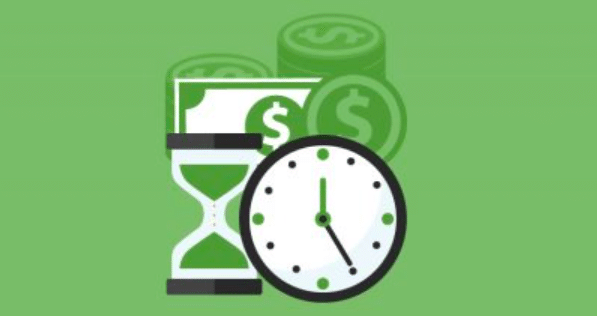
Efficiency doesn’t just have a place in the office. Your money can be efficient, too, if you know how to be productive with your income.
Personal finance is a tricky subject, of course. Everyone has their own goals—a car, new appliances, pursuing new investments. Similarly, everyone has their own obstacles, ranging from debt to uncertainty regarding the stock market. If you put your mind to it, though, you’ll find that it’s easier than you might think to make your cash work.
Tips for Being More Productive with Your Income
Start with these eight simple suggestions:
1. Start Saving Early
The best time to start saving money is when you’re young and single. The second best time is today. The sooner you’re able to put substantial sums of money away, the more time that money has to grow. If you can establish a retirement fund while you’re still in your twenties, your savings will grow exponentially. That’s the magic of compounding.
The sooner you’re able to earn compound interest, the more money you’ll have at your disposal when you retire. That said, don’t feel bad if you haven’t been able to put much money into a retirement fund yet. You can’t go back in time and start saving earlier. However, what you can do now is set aside a percentage of your paycheck to feed into your retirement fund regularly. Check-in with your employer, as well, and see if they will match your investments while you’re part of their team.
2. Keep a Nest Egg at the Ready
It’s never a bad idea to have a nest egg in your savings account. There will be days, after all, when something goes wrong. Maybe you blow a tire on the road, or perhaps a loved one gets sick. In either case, you’ll want a nest egg in place to help you contend with that day’s challenges.
Nest eggs like this can also generate interest if you let them sit for long enough. While that interest may compound in pennies, you’ll still be able to generate a small passive income without so much as lifting a finger.
When it comes to protecting your nest egg, you can get creative, too. For example, purchasing coverage from home warranty companies can help you to avoid having to pay out for emergency repairs on major systems in your home.
If you have the opportunity to do so, then determine what kind of financial cushion you want to build up in your savings account. The longer you can avoid dipping into it, the better off your future self will be.
3. Embrace a Side Hustle
It seems like everyone these days has a “side hustle.” Whether they’re selling homemade goods on Etsy, working part-time as photographers, or chasing other hobbies, most people have found a way to make money outside of the office.
It can be challenging to start hustling on the side, of course. Making time to hold a second job—especially one that requires even more groundwork than an office job—can be taxing. The financial benefits, however, are many. If, for example, you love to take photos in your spare time, you can earn money pursuing your hobby on the weekends by taking wedding photos. That income supplements what you’re earning in the office and makes it easier for you to pursue your passions.
Side hustles for those newly interested in spreading their wings can include the following jobs:
- Blogging
- Ridesharing
- Tutoring
- Online freelancing
- Listing a rental home on Airbnb
- Selling old belongings on eBay or Etsy
- Taking online surveys
A side hustle, it’s worth noting, can eclipse your office job if it’s in the right field. Although, when you’re just starting, be sure to keep some space between a side hustle and your day job. If the responsibilities from your side hustle begin to interfere with your responsibilities at work, then you may want to consider alternative ways to boost your income.
4. Remove Debt from Your Playbook
Debt is perhaps the most powerful force limiting your income’s productivity. It doesn’t matter whether you’re paying off credit card debt every month, contending with a mortgage, or facing down student loans. The more money you have to put into someone else’s pocket, the less you can put to work toward your financial goals.
Of course, you’re not alone if you’re contending with unwanted debt. Americans collectively face 4.2 trillion dollars worth of consumer debt alone. Political stances on the validity of student loan debt are ever-changing, as well, leaving active students to folks in their forties wondering what their financial future holds.
If you want a more active and productive income, however, you need to remove debt from your playbook. This, of course, is easier said than done. The best way to do it, though, is to tackle it head-on.
Setting Your Goal
Sit down—either on your own or with a financial professional—to determine just how much debt you’re in. Higher numbers can be intimidating, but once you have a goal to shoot for, managing your money gets a little easier.
Creating Your Budget
With that big number in mind, you can start to cultivate a budget. Determine how much money you want to designate toward payments every month. If there’s a percentage you can cut from your paycheck to send directly to your debt, consider doing so.
Don’t forget to give yourself space in your budget for things that you enjoy. Whether it’s nice chocolate from a local shop or a bottle of wine at the end of the week, don’t let your financial ambitions for the future suck the fun from your life. When you’re facing down debt, small celebrations make each payment feel all the more substantial.
Avoid Worsening Your Debt
If you don’t have a substantially flexible income, you may rely heavily on your credit card for groceries, entertainment, and bills. However, if you’re trying to get out of debt, you’ll want to limit these purchases. Consider putting a personal cap on your credit, one that you know you can pay off every month. You don’t want to forgo a credit card altogether—your credit score, after all, is essential. The less you can purchase on credit, however, the more you’ll be able to put into your savings.
5. Capitalize on Limited-Risk Investments
The stock market is a fickle mistress. Investing, however, is part and parcel of transforming your income into something more substantial. Now, that doesn’t mean you have to go and invest a considerable sum into unreliable stocks.
Instead, consider what kind of low-risk investment options may be available to you through an employer. An employer who offers you the opportunity to invest in company stock does net some benefits for themselves. If you have the chance to not only benefit from your company’s success but to have your supervisor match your investment, then your income is all but guaranteed to increase and be more productive.
6. Explore Your Options in Real Estate
There are investment opportunities available to you outside of the stock market. You always have the opportunity to invest in real estate. There are two different ways to do this. For starters, you can buy land or property and rent it to other parties for a profit. This more traditional means of real estate management is well-tread and comes with a reasonable amount of financial security.
New Investment Opportunities
Alternatively, you can contribute to a real estate crowdfunding project. Real estate crowdfunding projects tend to net you long-term gains. You and several peers can go in on another person’s project and generate a passive income from that project’s success several years down the line. Real estate crowdfunding is a relatively new practice, though its early investors have seen substantial success. You can explore a few different real estate crowdfunding platforms to learn more about what projects may help you be more productive with your income.
7. Establish Secondary Funds
Whether you’re self-employed or work in a traditional office environment, there’s nothing quite so harrowing as tax season. The taxes you have to pay to federal and state governments is, in essence, the money you earn but never get to see. This makes it so difficult to be productive with the income you make.
While you can pick and choose what kind of deductions to take advantage of when working with an account, there are easier ways to limit the amount of taxes you have to pay per year. If you want to set some of your hard-earned cash aside, consider opening up a second fund.
Secondary funds serve two purposes. For starters, they allow you to set money aside for the future, ensuring that you have a nest egg on hand should you need one. More importantly, however, they reduce your taxable income. Any money you put into an HSA, FSA, SEP, IRA, or 401(k) is money that your federal and state governments cannot tax. In short, secondary funds reduce your overall income. While you may have made $ 100,000 in a year, then you may benefit from taxes taken from a lower bracket.
8. Open a High-Yield Savings Account
It’s a mistake to keep all of your hard-earned money in your checking account. If you want your money to do some work on your behalf, consider opening a high-yield savings account instead.
Most online banks offer their patrons access to high yield savings accounts. The interest you get from high-yield savings accounts far eclipses what you might otherwise earn when working with a standard bank. Put another way—the more money you’re able to save, the more money you’re going to make.
If you open one of these accounts at a legitimate bank (which you hopefully know to do), there are zero risks of capital loss.
There’s more than one way to be more productive with your income. Don’t let it languish in your checking or savings account. Instead, explore the unique ways you can grow your income stream without getting a second or third job. The more you can spread out what you earn, the healthier your financial life will be.
Business & Finance Articles on Business 2 Community
(43)







